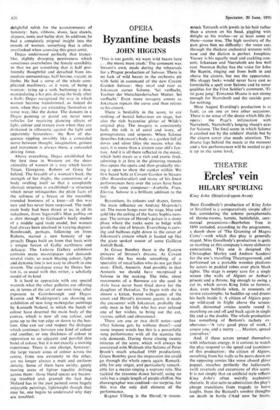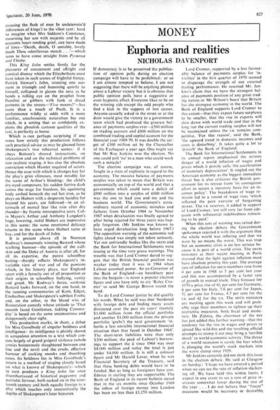THEATRE
Ercles' vein
HILARY SPURLING
King John (Stratford-upon-Avon) Buzz Goodbody's production of King John at Stratford is a comparatively simple affair but, considering the solemn paraphernalia of throne-rooms, turrets, battlefields, cere- monial processions—Beerbohm Tree in 1899 included, according to the programme, a dumb show of 'The Granting of Magna Carta'—with which this play is generally staged, Miss Goodbody's production is quite as startling as this cbmpany's more elaborate concoctions. This one is designed (by Christopher Morley and Andrew Sanders) for the RSC'S travelling Theatregoround, and performed on a portable wooden platform by actors in padded robes over plain black tights. The stage is empty *save for a single screen (the walls of Algiers or Arthur's prison) and a throne, big enough to swing a cat in, which serves King John as fortress, dais, even bolthole when, in moments of severe catastrophe, he huddles up and drums his heels inside it. A citizen of Algiers pops up wild-eyed in fright above the screen; small, demented armies scuttle round it, marching on and off and back again in single file and at the double. The whole production has something of Bottom's rackety ex- uberance—`A very good piece of work, I assure you, and a merry ... Masters, spread yourselves.'
And, if these actors spread themselves with infectious energy, it is curious to watch the play respond to the speed and jauntiness of this production : the citizen of Algiers, mouthing from his walls as he peers down on the opposing armies like some absurd glove puppet, matches perfectly the ludicrously swift reversals and excursions of this scene. It is not simply that an artificial style reflects King John's often weirdly euphuistic rhetoric. It also suits to,admiration the play's abrupt transitions from tragedy to horse laughs, from the Bastard's sombre thoughts on death in battle (`And now he feasts,
mousing the flesh of men In undetermin'd differences of kings') to the vilest rant: hard to imagine what Mrs Siddons's Constance, mourning her son with majestic and by all accounts heart-rending grief, can have made
of lines—Death, death, 0 amiable, lovely death Thou odoriferous stench . . .'—which seem to have come straight from Pyramus and Thisbe.
This King John settles firmly for the pleasures of amazement and affright and
comical dismay which the Elizabethans must have taken in such scenes of frightful frenzy. Patrick Stewart's John, strutting one mo- ment in triumph and humming quietly to himself, collapsed in gloom the next as he bends a rolling eye on the prophet from Pomfret or gibbers with funk at dread portents in the streets—'Five moons?'—has more than a touch of Pooh. It is a performance wildly at odds with a more familiar, anachronistic naturalism but one which, in a setting that so confidently ex- ploits the ghoulish cartoon qualities of the text, is perfectly at home.
Which is •not perhaps surprising if one notes how strictly this production follows such practical advice as may be gleaned from Shakespeare's two rehearsal scenes: if it obeys Bottom's shrewd instructions, on relaxation and on the technical problems of non realistic staging, it has also the absolute conviction which Hamlet required of actors. Hence the ease with which it changes key for the play's grim climaxes, most notably for the scene of Arthur's blinding: the child's dry-eyed composure, his sudden furtive dash across the stage for freedom, his squirming body arched beneath the red hot iron, as he plays on Hubert with a desperate lucidity far beyond his years, are followed—in an af- termath of mortal fear like rain after dry thunder—by frantic retrospective tears. Col- in Mayes's Arthur and Anthony Langdon's huge, lowering, stolid Hubert are impressive in this scene; the same emotional delicacy returns in the scene where Hubert turns at bay, and for the death of John.
It is present above all in Norman Rodway's immensely winning Bastard whose scathing humour—the episode of the calf- skin and the Duke of Austria is after all, for all its expertise, the purest schoolboy baiting—sharply reflects Shakespeare's in- variable view of war and of the passions which, in his history plays, tear England apart with a ferocity out of all proportion to their origins in schoolboy bullying, vanity and greed.. Mr Rodway's fierce, sardonic Bastard looks forward, on the one hand, to the running commentaries of Kent, Edgar, Enobarbus and Shakespeare's subtlest Fools; and, on the other, to the bland wits of Restoration comedy whose attitude to 'That smooth faced Gentleman, tickling Commo- dity' is based on the same uncensorious and dangerously clear sight.
This production marks, in short, a debut for Miss Goodbody of singular boldness and intelligence: its intelligence is plainly shown in scrupulous attention to a text which con- sists largely of grand guignol violence (whole armies boisterously slaughtered between one line and the next) and the crude, effective humour of cocking snooks and thumbing noses. Its boldness lies in Miss Goodbody's return to a method of staging closely based on what is known of Shakespeare's—which in turn produces a King John for once disembarrassed of historical pageantry and patriotic fervour, both tacked on in the nine- teenth century and both equally foreign to a play which touches only intermittently the depths of Shakespeare's later histories.



































 Previous page
Previous page